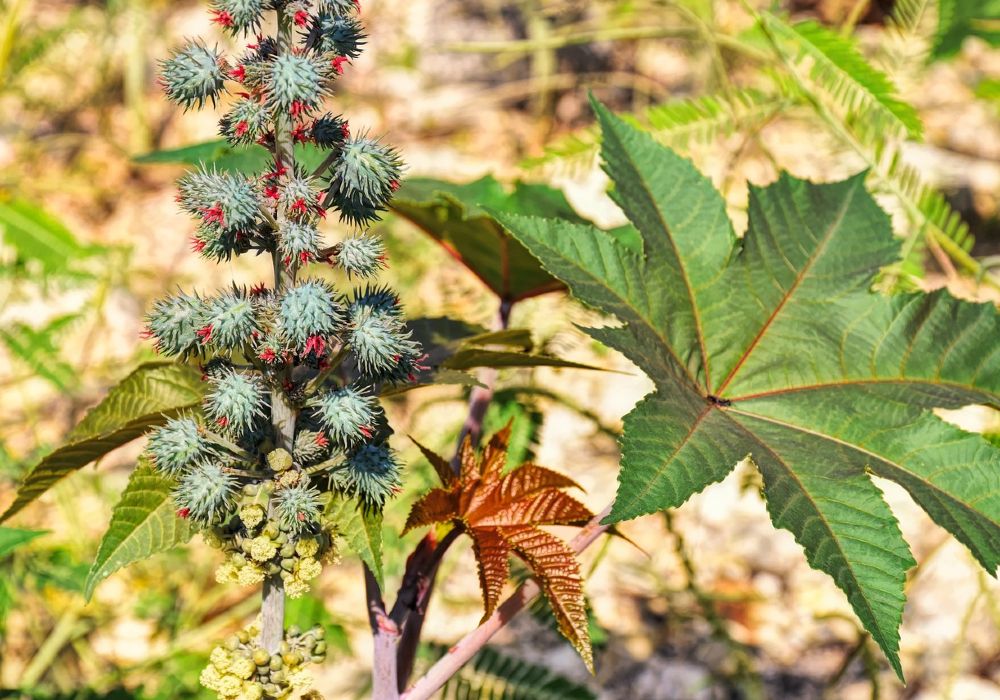Finding safe and non-toxic ways to keep animals from damaging your plants and making a mess in your yard can be hard if you want to protect your lawn and garden. Castor oil, on the other hand, is a natural and effective way to keep animals that dig, like moles, voles, and gophers away. It may also keep away other animals you don’t want, like raccoons, skunks, and armadillos that damage plants while they dig for grubs. And it does so without harming the critters or damaging your lawn, plants, or flowers.
The seeds of the Ricinus communis plant are used to make castor oil, which is a natural and safe alternative to chemicals and traps. It has unique properties that can effectively disrupt pests feeding and nesting behaviors. The oil gives off a strong smell and a bad taste that can keep pests from eating your grass and garden plants. This makes it a great choice if you’re looking for a safe and long-lasting solution.
Castor oil has long been known for its versatile uses, including health beauty and household applications. But did you know that castor oil can also be highly beneficial when used in the garden? From deterring moles to lubricating tools, castor oil has a number of excellent applications for gardeners.
What is Castor Oil?
Castor oil comes from pressing the seeds of the castor oil plant (Ricinus communis) The oil has a distinctive taste and smell, which drives away pests Castor oil has been used commercially in medicines, soaps, textiles, and more. But it also makes an effective natural pest control and maintenance aid in the home garden when used properly.
Using Castor Oil to Repel Garden Pests
Certain animal pests like moles, voles, armadillos, and skunks can cause extensive damage in gardens by digging holes and tunnels. Castor oil can be used as a natural deterrent.
When castor oil is applied to soil, the strong odor and taste drive away burrowing pests so they avoid digging in those areas. But it does not harm the animals, unlike toxic chemical repellents.
To use castor oil as an animal repellent
-
Mix 1 cup castor oil and 1 cup dish soap until foamy.
-
Dilute 2 tablespoons of the mixture per gallon of water.
-
Use a hose attachment to spray on any tunnels or molehills.
-
Reapply weekly to maintain effectiveness. The oil must contact soil to deter pests.
Research shows castor oil also repels insects when mixed with other natural oils. Test small areas first before wide application.
Additional Uses of Castor Oil in the Garden
Aside from repelling pests, castor oil has numerous other uses for gardeners:
-
Lubricating tools – Prevent rust on pruners, shears, and hinges by applying oil directly.
-
Polishing furniture – Mix with beeswax and olive oil then rub on wood furniture.
-
Cleaning hands – Remove dirt easily with a hand scrub of castor oil and natural soaps.
-
Reviving plants – Occasional application on fern fronds restores shine and health.
-
Healing plant wounds – Applying castor oil to pruning cuts or abrasions aids natural healing.
-
Coating compost piles – A layer of castor oil helps retain heat and moisture in compost.
With just a small bottle of castor oil, gardeners can accomplish a wide array of useful tasks like these around the yard and garden plots.
Choosing High Quality Castor Oil
Look for cold-pressed, hexane-free castor oil from a reputable source. Jamaican black castor oil is made by roasting beans before pressing and has added benefits. Always do a patch test on plants before full application.
When buying castor oil, be aware that the plant seeds themselves are toxic, so keep castor bean plants away from kids and pets. But the oil and its derivatives are perfectly safe.
Castor Oil Availability and Cost
Castor oil is easy to find in the health and beauty sections of most pharmacies and grocery stores. It’s also readily available online.
Cost for a 4 ounce bottle ranges from $5 to $15 depending on quality. Buying in larger bulk sizes can help lower the cost-per-ounce. Be sure to store castor oil in a cool, dark place between uses.
The Many Benefits of Castor Oil in the Garden
Using castor oil is an inexpensive, non-toxic way to control common garden pests while also caring for your plants. It’s safer for people, pets, and the environment versus harsh synthetic pesticides and chemicals.
With just this simple natural oil in your gardening toolkit, you’ll gain an effective multi-purpose product that replaces several less eco-friendly alternatives for a greener, healthier garden. Give castor oil a try – your garden will thank you!
Castor oil, is it safe #garden #summergarden #gardening
FAQ
Is castor oil safe to use in the garden?
What animals will castor oil repel?
Does castor oil repel bugs?
How to use castor oil as a pesticide?
- A Complete Guide to Caring for Yuki Cherry Blossom Shrub - January 23, 2025
- Identifying Red Hot Poker Seeds: What to Look For When Harvesting Torch Lily Pods - January 23, 2025
- A Complete Guide to Harvesting Evening Primrose Seeds - January 23, 2025

